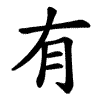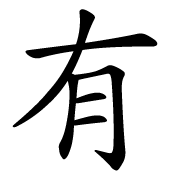有
Hello, you have come here looking for the meaning of the word 有. In DICTIOUS you will not only get to know all the dictionary meanings for the word 有, but we will also tell you about its etymology, its characteristics and you will know how to say 有 in singular and plural. Everything you need to know about the word 有 you have here. The definition of the word 有 will help you to be more precise and correct when speaking or writing your texts. Knowing the definition of有, as well as those of other words, enriches your vocabulary and provides you with more and better linguistic resources.

Ordine dei tratti 
Ordine dei tratti (animazione) 
Ordine dei tratti 
(kanji di grado 3)
Go'on: u
Kan'on: yū
Kun: aru, motsu, tamotsu
Nadzuke: ari, sumi, tamotsu, tō, tomo, nao, nari, michi, mochi, ri
Def: esistere, apparire, tenere, mantenere, esistenza, cose, roba

有 (vai ai composti)
Hanzi tradizionale e semplificato; 6 tratti, radicale 74 (月)+2
Significato (come carattere):
- avere, possedere
- essere, esserci, esistere
- esserci, essere in (con il luogo come soggetto e ciò che vi si trova come complemento oggetto)
- esserci, accadere (con il tempo come soggetto e ciò che vi accade come complemento oggetto)

Ascolta la pronuncia :
come hanzi, composto da 又 ("mano", come componente semantica) e dal radicale 月 come componente fonetica
Da non confondere con


Go'on: u
Kan'on: yū
Kun: aru, motsu, tamotsu
Nadzuke: ari, sumi, tamotsu, tō, tomo, nao, nari, michi, mochi, ri
Def: esistere, apparire, tenere, mantenere, esistenza, cose, roba
有 (vai ai composti)
Kanji base (Kyōiku kanji) di grado 3; 6 tratti, radicale 74 (月)+2
- Lettura Nadzuke: あり (ari), すみ (sumi), たもつ (tamotsu), とお (tō), とも (tomo), なお (nao), なり (nari), みち (michi), もち (mochi), り (ri)
Significato (come carattere):
有 (hiragana ゆう, romaji yū)
come kanji, derivato dal corrispondente carattere cinese
- cinese:
- MDBG Chinese-English dictionary, ricerca per "有"
- Zhao Xiuying, Franco Gatti, Dizionario compatto italiano-cinese e cinese-italiano, Zanichelli, pagina 233
- Zhang Shihua, Dizionario di cinese, Hoepli, pagina 475
- Federico Masini et. al., Il cinese per gli italiani - vol. 1, Hoepli
- The Free Dictionary, edizione online (cinese)
- giapponese:
- Denshi Jisho - Online Japanese dictionary, ricerca per "有"